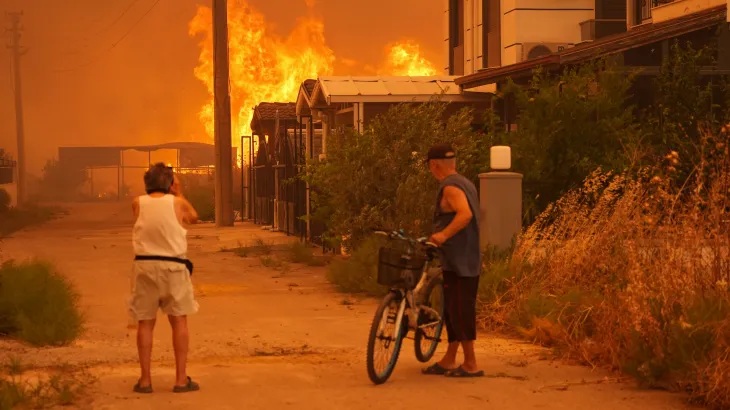Türkiye is battling fierce wildfires for a second consecutive day in its western province of Izmir, prompting the evacuation of four villages and two neighbourhoods, officials confirmed Monday, June 30, 2025.
Local media sources say that the fires, driven by relentless winds and scorching temperatures, have triggered a full-scale emergency response and disrupted key infrastructure in one of the country’s most populous coastal regions.
The country’s Minister of Forestry, Ibrahim Yumakli, said that winds gusting between 40 and 50 kilometers per hour (25–30 mph) have intensified the flames.
This is particularly in the Kuyucak and Doganbey areas.
Speaking to reporters in Izmir, Yumakli revealed that over 1,000 personnel are involved in the firefighting effort, backed by helicopters, fire-fighting planes, and dozens of ground vehicles.
The blaze has already caused major disruptions.
These include the temporary suspension of all operations at Izmir’s Adnan Menderes International Airport due to safety concerns, Turkish media reported.
Dramatic footage from the scene shows smoke clouds rolling across charred hills as emergency teams deployed tractors outfitted with water trailers and helicopters airlifting water from nearby sources.
The situation grew even more dire overnight when high winds briefly grounded aerial units.
This left just two water-bombing planes and ground crews to hold back the fast-moving fire.
The initial outbreak began on Sunday between Seferihisar and Menderes districts.
According to Izmir Governor Suleyman Elban, winds of up to 117 kmph (73 mph) allowed the fire to spread with alarming speed.
Five neighbourhoods in Seferihisar have since been evacuated as flames crept dangerously close to homes.
In the village of Urkmez, local residents took matters into their own hands, cutting down trees to create firebreaks in a desperate attempt to protect their homes.
One witness told AFP that villagers were working side by side with fire crews, doing whatever they could to slow the fire’s advance.
Complicating the situation further, a separate fire broke out at a landfill in the district of Gaziemir, just 13 kilometers (8 miles) from central Izmir.
The fire quickly spread to adjacent woodland and reached the Otokent industrial zone, a sprawling area housing dozens of car dealerships.
Television footage from Turkish news channel NTV showed at least one dealership engulfed in flames.
Türkiye’s Mediterranean and Aegean coasts have become increasingly vulnerable to wildfires; a trend scientists link directly to climate change.
Rising temperatures and prolonged dry spells have created the ideal conditions for blazes to ignite and spread uncontrollably.
Last year, the same region in Izmir was devastated by a major wildfire, underscoring the growing frequency and intensity of such events.
The crisis in Türkiye mirrors a broader pattern emerging across southern Europe, where countries are bracing for yet another week of extreme heat and fire risk.
In France, emergency crews were called to battle a wildfire in the Corbières region of Aude in the southwest, where temperatures surged past 40°C (104°F).
Precautionary evacuations included a local campsite and an abbey threatened by the advancing flames.
Greece, too, remains on high alert after firefighters last week struggled to contain a forest blaze just south of Athens.
The fire forced multiple evacuations and underscored the vulnerability of Mediterranean landscapes during prolonged heatwaves.
In Portugal, the national weather service issued red alerts for several southern regions.
These included the capital Lisbon, warning of dangerous temperatures and a high risk of fire until at least Monday night.
As wildfires and heatwaves increasingly converge across southern Europe and the Mediterranean, experts warn that these conditions are no longer isolated anomalies but part of a growing climate emergency.
Governments are being urged to invest in prevention strategies, expand firefighting capacity, and address the root causes driving these disasters.
For now, the people of Izmir and surrounding regions remain on edge, hoping that shifting winds, aerial reinforcements, and community resilience can hold back the worst of the firestorm.



